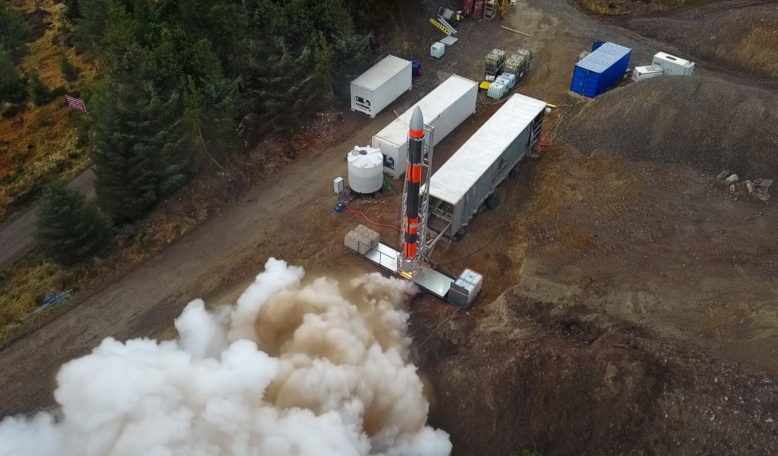British satellite firm Skyrora has completed a static test of its fully integrated Skylark-L launch vehicle, an achievement that marks the country’s first ground rocket test in 50 years.
The test, which was completed at the company’s mobile launch complex at Kildemorie Estate in North Scotland earlier this month, saw Skylark-L perform all actions of a launch while restrained to the ground and prevented from taking off; a move that now paves the way forward for the rocket to launch from a British spaceport as early as spring 2021.
“We have successfully static tested a fully integrated, sub-orbital Skylark L launch vehicle in flight configuration,” says Dr Jack-James Marlow, who led Skylark-L’s static fire testing operations. “This means we performed all actions of a launch but did not release the vehicle. The rocket engine successfully burned, with all vehicle systems showing nominal operation.”
Skylark-L is a bi-liquid propellent launch vehicle that is capable of lofting a payload of up to 60 kilograms to a height of approximately 100 kilometres to the Karman line – an imaginary boundary in Earth's atmosphere that marks the beginning of space.
It uses a combination of hydrogen peroxide and kerosene which are pressure fed into a Skyrora 30 kN engine, but when commercial, the company plans to use their own Ecosene, an equivalent Kerosene fuel made from un-recyclable plastic waste.
This is Skyrora’s first sub-orbital flight vehicle and the company, who are one of a new breed of private rocket companies developing the next generation of launch vehicles for the small satellite market, aim to launch a low Earth orbital (LEO) version called the Skyrora XL rocket by 2023.
In order to complete the test, the Skyrora team accomplished the build of a mobile launch complex in record time right in the heart of the Scottish Highlands, whilst also adhering to strict social distancing measures due to the ongoing Covid-19 pandemic.
“It is very hard to oversell what we have achieved here with this test; the whole team has pulled through again to deliver another UK first,” Marlow says. “The test did not only validate the vehicle, it also tested our mobile launch complex's ground equipment and performed many cold flow and fuel/defuel tests. In all, there were over one hundred unique operations and the team has gained vital experience. This collection of tests, combined with the 25 other engine tests this year, allow us to take another step along our technology roadmap to orbital launch.
This is the first time a launch vehicle of this magnitude has been tested in the UK since the country’s Black Arrow Programme ended 50 years ago, when it was shelved in favour of cheaper American Scout rockets.
"We see this as being the first significant step towards reaching space from our own soil and are very proud to have taken that step as part of the UK's Space ambitions. We are now in a full state of readiness for launch. It is this milestone that is the start of the UK’s new space revolution, a fantastic example of the potential of what the UK Space holds for future,” Skyrora's chief executive officer, Volodymyr Levykin said.
"With the expertise in place and all the necessary hardware at the ready, we are poised to take the next steps in making the UK a serious leader in the Space business once again".
If you've enjoyed reading this article, please consider subscribing to ROOM Space Journal to gain immediate and full access to the latest magazine feature articles and receive your own print and/or digital copies of ROOM magazine delivered direct to your door or electronically.











